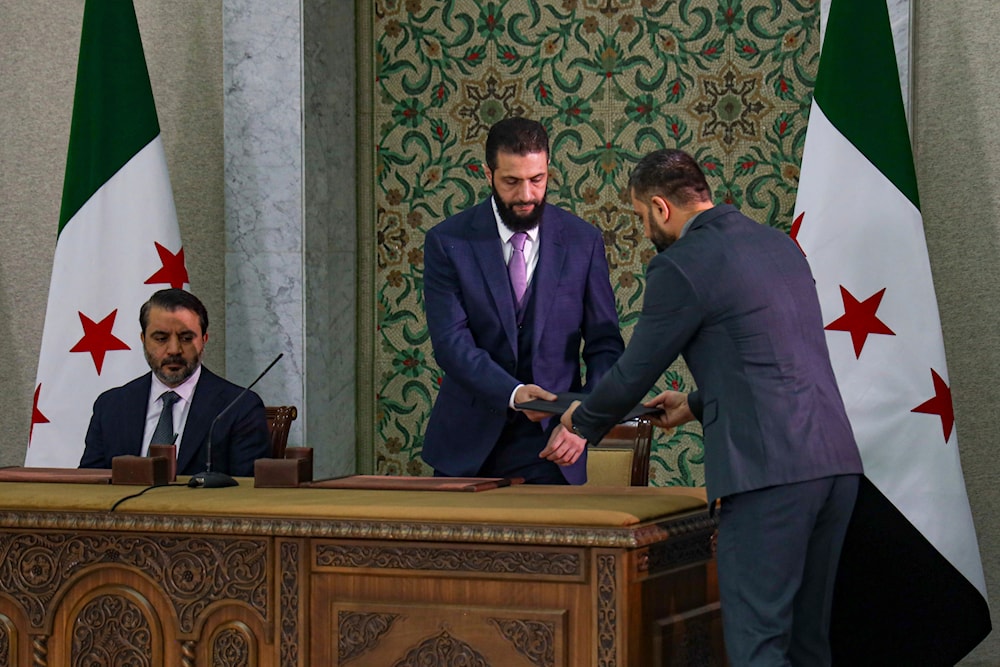Syria's constitutional declaration risks endangering rights: HRW
Human Rights Watch warned that Syria’s newly approved constitutional declaration risks consolidating executive power and compromising judicial independence.
-

Syria's interim president, Ahmad al-Sharaa, center, prepares to sign a temporary constitution for the country in Damascus, Syria, on Thursday, March 13, 2025. (AP)
Syria’s newly approved constitutional declaration, intended to guide the country’s transition, centralizes power within the executive branch and risks compromising judicial independence, Human Rights Watch warned on Wednesday.
Endorsed by Interim President Ahmad al-Sharaa on March 13, 2025, the declaration grants the president sweeping control over judicial and legislative appointments without oversight. This raises serious concerns about the rule of law and human rights protection unless proper safeguards are implemented. The declaration frames these extensive powers as essential for managing Syria’s transitional period.
“Without stronger safeguards and independent oversight, this declaration risks consolidating executive control at the expense of fundamental freedoms at a crucial time for Syria’s future,” said Adam Coogle, deputy Middle East director at Human Rights Watch.
“Given the rampant unchecked authority of the previous government, it is paramount for Syria to establish a system that holds everyone accountable for their abuses and crimes.”
As mentioned in the report, al-Sharaa was appointed president in late January 2025 following a conference of armed groups and is set to lead Syria’s five-year transitional period until a permanent constitution is adopted and elections are held, as outlined in Article 52 of the constitutional declaration.
According to the report, transitional periods may justify temporary extraordinary measures, but they should not come at the expense of fundamental rights. Syria’s new constitutional declaration risks consolidating authoritarian rule rather than paving the way for a democratic transition.
Why is it concerning?
Despite claiming judicial independence, the declaration lacks safeguards. Article 47 grants the president unchecked power to appoint all seven Higher Constitutional Court members, raising concerns about accountability without independent oversight. This provision could increase the president’s control over constitutional interpretation, bypassing parliamentary input and making the judiciary vulnerable to political influence.
The declaration gives the president extensive control over legislative appointments, with one-third of the transitional parliament appointed by him and the rest by a president-selected committee. Though it includes provisions for justice and human rights, their effectiveness remains uncertain without independent oversight.
The report calls for repealing Assad-era laws, overturning unjust court rulings, restoring confiscated property, and creating a transitional justice body. However, without judicial safeguards or checks on executive power, the effectiveness of these reforms in ensuring accountability and human rights remains uncertain, Human Rights Watch warned.
What does the framework include?
The framework includes rights protections such as the presumption of innocence, bans on torture and enforced disappearance, the right to due process, and commitment to international human rights treaties. However, concerns remain over free expression limitations, as Article 49(3) criminalizes “glorifying the obsolete al-Assad regime or its symbols” and “denying his crimes or praising, justifying, or trivializing them.” The vague wording of these provisions raises fears they could be used to suppress dissent and limit speech.
As president, al-Sharaa holds executive authority and controls the appointment and dismissal of ministers. The framework establishes a rigid presidential system with no parliamentary power to impeach the president or check executive power. Cabinet ministers report solely to the president, reinforcing centralized control.
Human Rights Watch has called on Syrian authorities to revise the constitutional declaration to include stronger safeguards for judicial independence and legislative oversight, emphasizing that these changes are essential for ensuring Syria’s transition respects human rights, holds abusers accountable, and fosters lasting accountability.
"Syria’s transition should be a pathway to a rights-respecting democracy – not a pretext for entrenching authoritarian control," Coogle said.

 4 Min Read
4 Min Read










